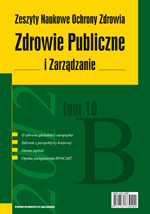Samoocena zdrowotnych kompetencji informacyjnych Polaków w świetle koncepcji samoskuteczności. Analiza wybranych wyników polskiej części Europejskiego
Self- assessment of health information literacy by Polish population, in light of the self-efficacy concept. Analysis of the selected results of Polis
Author(s): Barbara Niedźwiedzka, Yuryi Taran, Zofia A. SłońskaSubject(s): Social Sciences
Published by: Wydawnictwo Uniwersytetu Jagiellońskiego
Keywords: health information literacy; health literacy; information behaviour; self-efficacy
Summary/Abstract: Health information literacy allows people to find, evaluate and apply information regarding health and health services utilisation. The goal of this analysis is to present: the self-assessment of health information literacy done by Poles, socio-demographic determinants of this assessment, and to discuss its possible consequences in light of self-efficacy concept. This knowledge highlights certain aspect of society’s’ health literacy, and can be useful in designing pro-health educational interventions in such a way so they meet the needs and capabilities of target groups. Method. Direct questionnaire survey with randomly selected, stratified by age and gender group of respondents (+15, n10000, what was 67% of the sample). The study design and the survey questionnaire were developed by the HLS-EU researchers. The survey was conducted by TNS Opinion in July and August 2011 in 8 European countries including Poland. Among 47 questions in HLS-EU questionnaire, 30 questions were selected as those that can serve as indicators of health information competency, 10 question for each of 3 areas of information skills: seeking, evaluation and application. In this study only data regarding Polish population was analysed. Results. Approximately 38% of Polish population assess their health information literacy as low. Respondents claim that they have difficulty in finding, evaluating and applying health information. Low level of self-assessment can be observed more often among men, elderly and people with low level of education, and also among respondents who see their health status as bad or suffer from at least one chronic illness, and also among these who are in economically difficult situation. Among tasks connected with seeking information most difficult for the respondents were: finding information about political changes that may affect health, information regarding coping with stress or depression, information about vaccinations and health screenings and information on symptoms and treatments of illnesses that concern them. As most difficult to evaluate Polish respondents find the reliability of information about diseases and health risks provided by mass media. In area of application, most difficult to apply is information regarding activities that improve health and well-being in community. Conclusions. Low assessment of self-efficacy in looking for and using health information by one third of Polish respondents may indicate real deficiency of skills, may demotivate them to undertake such activities, and may hinder educational interventions. Elderly, low educated, ill or assessing their health as bad persons should be in first place the aim of educational interventions to raise their information literacy. This can be beneficial for improving their health literacy.
Journal: Zdrowie Publiczne i Zarządzanie
- Issue Year: 10/2012
- Issue No: 3
- Page Range: 210–218
- Page Count: 9
- Language: Polish

